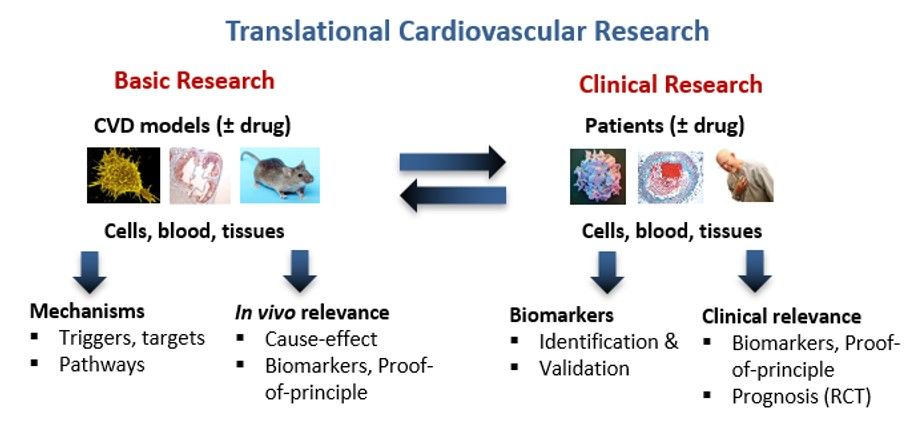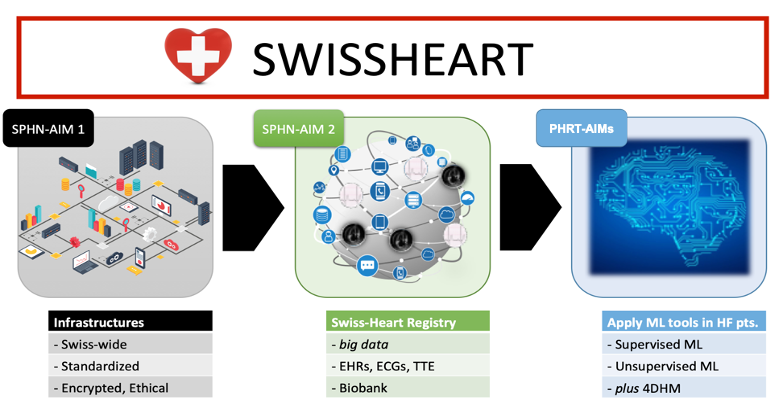Research Group: Atherosclerosis, thrombosis & inflammation (Group leader: Prof. Christian M. Matter, MD)
Christian Matter is Professor of Cardiology at the University Hospital Zurich. He completed Medical School at the University of Zurich and is a board-certified internist and cardiologist with clinical training in Lucerne, Zurich and Boston. After a postdoctoral fellowship at the Brigham and Women's Hospital in Boston he returned to the University Heart Center in Zurich.
There he now heads Translational Research and the Cardio-oncology service and works as a non-invasive clinical cardiologist. His research focuses on the effects of inflammation and caloric restriction on atherosclerosis and thrombosis using cell culture and mouse models. These experimental findings are complemented with clinical studies in patients with myocardial infarction, acute heart failure and cancer.

Ongoing Research Lines
The group focused on the following basic and translational research topics:
- Characterize immuno-metabolic pathways in atherothrombosis. His experimental research has addressed the role of PARP1, JNK2, sirtuins 1, 3 and 6 in endothelial function, atherosclerosis, and thrombosis – using genetic loss-of-function mouse models and pharmacological interventions. He is currently extending these models to mice with mutations of clonal hematopoiesis of indeterminate potential (CHIP) in mice.
- Test novel prognostic biomarkers in patients with ACS. The translation of above experimental aim to patients with atherothrombosis, i.e. acute coronary syndromes (ACS) provided the basis for the Special Program University Medicine ACS-inflammation for which Christian Matter was the Co-PI. Since 2009 this multicenter Swiss cohort has recruited about 5’000 patients with detailed baseline data, outcome and a biobank. We test the role of immmunometabolic prognostic biomarkers. Together with Joachim Buhmann’s group from the ETH Zurich, they developed a machine learning-based risk score for 1 year mortality prediction in ACS patients. Moreover, we plan to apply an anti-cytokine strategy in patients with acute large myocardial infarctions.
- Standardized digital patient data for research and clinical use. The SwissHeart Failure Network (SHFN, funded by SAMW) constitutes an extension of our SPUM consortium build together with the Cardiology departments in Basel, Bern and Geneva. The SHFN is supported by the Swiss Personalized Health Network (SPHN) and ETH-related Personalized Health and Related Technologies (PHRT), Christian Matter is the main applicant of this collaborative project of the Swiss Precision Health Network (SPHN) together with Joachim Buhmann (main applicant PHRT) who coordinates experts in bioinformatics and machine learning for this joint Driver project. The SWISSHEART Failure Registry collects clinical, drug and laboratory values together with raw data from electrocardiograms and transthoracic echocardiography data of patients at risk for heart failure (ACS patients) and patients hospitalized for acute heart failure. These multi-dimensional patient data will be integrated into machine learning-based diagnostic and risk scores. This project aims to improve prediction, prevention and eventually treatment of patients with heart failure. The mid-to long-term goal is to automatically extract structured dataset not only for research, but with real-time feedback loops back to the treating doctor.
Figure: Scheme of the SwissHeart Failure Network (SHFN) to build IT infrastructure (Aim 1), a Swiss Heart Failure Registry (Aim 2) and apply machine learning (ML) tools in heart failure (HF patients (Aim 3).
- Improve understanding of inflammation / immunity in cardio-oncology focusing on immune check point inhibitors. Retro- and prospective analyses are performed with Dermatology (Reinhard Dummer’s team) with Isabella Sudano and Andreas Flammer. Moreover, we plan to elucidate interactions between exogenous damage (e.g., risk factors, infectious agents), the patient’s immune response to injury that is modulated by intestinal microbes and the subsequent organ damage which determines the phenotypes of cardiovascular disease. For this purpose, teaming up with Burkhard Ludewig and Michael Scharl will be crucial given their expertise in immunology and intestinal microbes, respectively.
Research Team
- Yu-Jen Wang, PhD student
- Tanja Engels, study nurse
- Carolin Gänssle – with Clinical Study Group of Barbara Stähli
- Annie Srdic. BSc
- Michael A. Matter – With Catheter Study Group of Christian Templin and Barbara Stähli
- Valentina Rossi – with Isabella Sudano and Andreas Flammer
Funding
- Swiss Academy of Medical Sciences (SAMW)
- Swiss Heart Foundation
- Novartis Foundation
- Sanofi-Regeneron, Amgen
Ricci R, Sumara G, Sumara I, Rozenberg I, Kurrer M, Akhmedov A, Hersberger M, Eriksson U, Eberli FR, Becher B, Boren J, Chen M, Cybulsky MI, Moore KJ, Freeman MW, Wagner EF, Matter CM*, Luscher TF*.*equal contribution. Requirement of JNK2 for scavenger receptor A-mediated foam cell formation in atherogenesis. Science, 2004; 306: 1558-61.
von Lukowicz T, Hassa PO, Lohmann C, Borén J, Braunersreuther V, Mach F, Odermatt B, Gersbach M, Camici GG, Stähli BE, Tanner FC, Hottiger MO, Lüscher TF, Matter CM. PARP1 is required for adhesion molecule expression in atherogenesis. Cardiovasc Res, 2008; 78 (1): 158-66.
Stein S, Lohmann C, Schäfer N, Hofmann J, Rohrer L, Besler C, Rothgiesser KM, Becher B, Hottiger MO, Borén J, McBurney MW, Handschin C, Landmesser U, Lüscher TF, Matter CM. SIRT1 decreases Lox-1-mediated foam cell formation in atherogenesis. Eur Heart J, 2010; 31(18): 2301-9.
Brokopp CE, Schoenauer R, Richards P, Bauer S, Lohmann C, Emmert MY, Weber B, Winnik S, Aikawa E, Graves K, Genoni M, Vogt P, Lüscher TF, Renner C, Hoerstrup SP*, Matter CM*. *Equal contribution. Fibroblast Activation Protein is Induced by Inflammation and Degrades Type I Collagen in Thin-Cap Fibroatheromata. Eur Heart J, 2011, 32(21): 2713-22.
Miranda XM, van Tits LJ, Lohmann C, Arsiwala T, Winnik S, Tailleux A, Stein S, Gomes AP, Suri V, Ellis JL, Lutz TA, Hottiger MO, Sinclair DA, Auwerx J, Schoonjans K, Staels B, Lüscher TF, Matter CM. The Sirt1 activator SRT3025 provides atheroprotection in Apoe-/- mice by reducing hepatic Pcsk9 secretion and enhancing Ldlr expression. Eur Heart J, Fasttrack, 2015;36(1):51-9.
Klingenberg R, Brokopp CE, Grivès A, Courtier A, Jaguszewski M, Pasqual N Vlaskou Badra E, Lewandowsi A, Gämperli O, Hoerstrup S, Maier W, Landmesser U, Lüscher TF, Matter CM. Clonal restriction and predominance of regulatory T cells in coronary thrombi of patients with Acute Coronary Syndromes. Eur Heart J, 2015;36(17):1041-8.
Klingenberg R*, Heg D*, Räber L, Carballo D, Nanchen D, Gencer B, Auer R, Jaguszewski M, Stähli BE, Jakob P, Templin C, Stefanini GG, Meier B, Vogt P, Roffi M, Maier W, Landmesser U, Rodondi N, Mach F, Windecker S, Jüni P, Lüscher TF*, Matter CM*. * shared contribution. Safety profile of prasugrel and clopidogrel in patients with acute coronary syndromes in Switzerland. Heart. 2015 Jun 1;101(11):854-63.
Winnik S*, Gaul DS*, Siciliani G, Lohmann C, Pasterk L, Calatayud N, Weber J, Eriksson U, Auwerx J, van Tits LJ, Lüscher TF, Matter CM. Mild endothelial dysfunction in Sirt3 knockout mice fed a high-cholesterol diet – Protective role of a novel C/EBP-ß-dependent feedback regulation of SOD2. Basic Res Cardiol 2016; 111:33, 552-7.
Klingenberg R, Aghlmandi S, Räber L, Gencer B, Nanchen D, Heg D, Carballo S, Rodondi N, Mach F, Windecker S, Jüni P, von Eckardstein A, Matter CM, Lüscher TF. Improved risk stratification of patients with acute coronary syndromes using a combination of hsTnT, NT-proBNP and hsCRP with the GRACE score. Eur Heart J Acute Cardiovasc Care. 2016 Dec 1; PMID: 28029055.
Gaul DS, Weber J, Van Tits LJ, Sluka S, Pasterk L, Reiner MF, Calatayud N, Lohmann C, Klingenberg R, Pahla J, Vdovenko D, Tanner FC, Camici GG, Eriksson U, Auwerx J, Mach F, Windecker S, Rodondi N, Lüscher TF, Winnik S, Matter CM. Loss of Sirt3 accelerates arterial thrombosis by increasing formation of neutrophil extracellular traps and plasma tissue factor activity. Cardiovascular Research, cvy036, Epub: 10 February 2018.
Arsiwala T, Pahla J, van Tits LJ, Bisceglie L, Gaul DS, Costantino S, Miranda MX, Nussbaum K, Stivala S, Blyszczuk P, Weber J, Tailleux A, Stein S, Paneni F, Beer JH, Greter M, Becher B, Mostoslavsky R, Eriksson U, Staels B, Auwerx J, Hottiger MO, Lüscher TF, Matter CM. Sirt6 deletion in bone marrow-derived cells increases atherosclerosis – Central role of macrophage scavenger receptor 1. J Mol Cell Cardiol. 2020 Feb;139:24-32. doi: 10.1016/j.yjmcc.2020.01.002.
Stein S, Weber J, Nusser-Stein S, Pahla J, Zhang HE, Mohammed SA, Oppi S, Gaul DS, Paneni F, Tailleux A, Staels B, von Meyenn F, Ruschitzka F, Gorrell MD, Lüscher TF, Matter CM. Deletion of fibroblast activation protein provides atheroprotection. Cardiovasc Res. 2020 May 13:cvaa142. doi: 10.1093/cvr/cvaa142.
Rossi VA, Denegri A, Candreva A, Klingenberg R, Obeid S, Räber L, Gencer B, Mach F, Nanchen D, Rodondi N, Heg D, Windecker S, Buhmann J, Ruschitzka F, Lüscher TF, Matter CM. Prognostic value of inflammatory biomarkers and GRACE score for cardiac death and acute kidney injury after acute coronary syndromes. Eur Heart J Acute Cardiovasc Care. 2021 Feb 24:zuab003. doi: 10.1093/ehjacc/zuab003.
Klingenberg R, Aghlmandi S, Gencer B, Nanchen D, Räber L, Carballo D, Carballo S, Stähli BE, Landmesser U, Rodondi N, Mach F, Windecker S, Bucher HC, von Eckardstein A, Lüscher TF, Matter CM. Residual inflammatory risk at 12 months after acute coronary syndromes is frequent and associated with combined adverse events. Atherosclerosis. 2021 Mar;320:31-37. doi: 10.1016/j.atherosclerosis.2021.01.012.
Weichwald S, Candreva A, Burkholz R, Klingenberg R, Räber L, Heg D, Manka R, Gencer B, Mach F, Nanchen D, Rodondi N, Windecker S, Laaksonen R, Hazen SL, von Eckardstein A, Ruschitzka F, Lüscher TF, Buhmann JM, Matter CM. Improving 1-year mortality prediction in ACS patients using machine learning. Eur Heart J Acute Cardiovasc Care. 2021, 10(8):855-865; doi: 10.1093/ehjacc/zuab030.
Klingenberg R, Aghlmandi S, Räber L, Akhmedov A, Gencer B, Carballo D, Nanchen D, Bucher HC, Rodondi N, Mach F, Windecker S, Landmesser U, von Eckardstein A, Hamm CW, Lüscher TF, Matter CM. Cysteine-Rich Angiogenic Inducer 61 Improves Prognostic Accuracy of GRACE (Global Registry of Acute Coronary Events) 2.0 Risk Score in Patients With Acute Coronary Syndromes. J Am Heart Assoc. 2021 Oct 19;10(20):e020488. doi: 10.1161/JAHA.120.020488. Epub 2021 Oct 8. PMI
